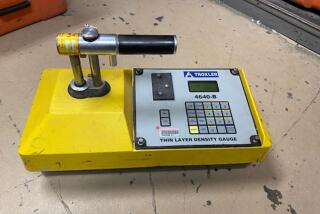Beverly Hills Firm Unveils Anthrax Detector
- Share via
A Beverly Hills company unveiled a device last week based on NASA technology that it said could better detect trace amounts of anthrax.
Universal Detection Technology said the device, called the Anthrax Smoke Detector, was ready to be sold commercially and would be tested in September for use in government facilities such as post offices.
The device, which employs technology developed by NASA’s Jet Propulsion Laboratory, is a fusion of an air sampler created to detect pollution and a spectrometer that can detect a molecule found only in bacteria, the company said.
The Universal Detection device is competing with Northrop Grumman Corp.’s anthrax detection system, which uses DNA sequencing to find the deadly spores.
Amir Ettehadieh, director of research and development for Universal Detection, said a single detector could monitor the air in a building the size of the Four Seasons Hotel in Beverly Hills, where the device was displayed for the first time at a news conference.
JPL developed the technology for space missions, including the current Mars rover mission, to ensure that vehicles did not carry bacterial spores from Earth into space.
The company obtained an exclusive license from JPL after the 2001 anthrax attacks on the U.S. Postal Service, and plans to work with the space agency to develop detectors for other biohazards, said Dr. Leonard Makowka, Universal Detection’s science advisor.
The anthrax detector, which resembles a small wall safe, is sensitive to concentrations of as little as 50 spores per liter of sampled air, and will raise an alarm within 15 minutes of an increase in bacteria levels, Ettehadieh said.
The device can be used only in buildings that have combined heating, ventilation and air-conditioning systems. It will detect increases in other bacterial spores besides anthrax, he said.
“The machine will hit its threshold much quicker than a person breathing [anthrax] all day,” he said, adding that humans must breathe in about 3,000 spores to become infected with the potentially deadly disease.
The devices cost $45,000 each but the price is expected to drop when the company begins mass producing them later in the year, he said.
The first few detectors were sold to an Italian company, which plans to resell them to the Italian government, Ettehadieh said. Universal Detection is in “advanced discussions” to supply the devices to the Port Authority of New York, he said.
Shares in Universal Detection fell 7 cents to 92 cents on the over-the-counter bulletin board.
More to Read
Inside the business of entertainment
The Wide Shot brings you news, analysis and insights on everything from streaming wars to production — and what it all means for the future.
You may occasionally receive promotional content from the Los Angeles Times.









